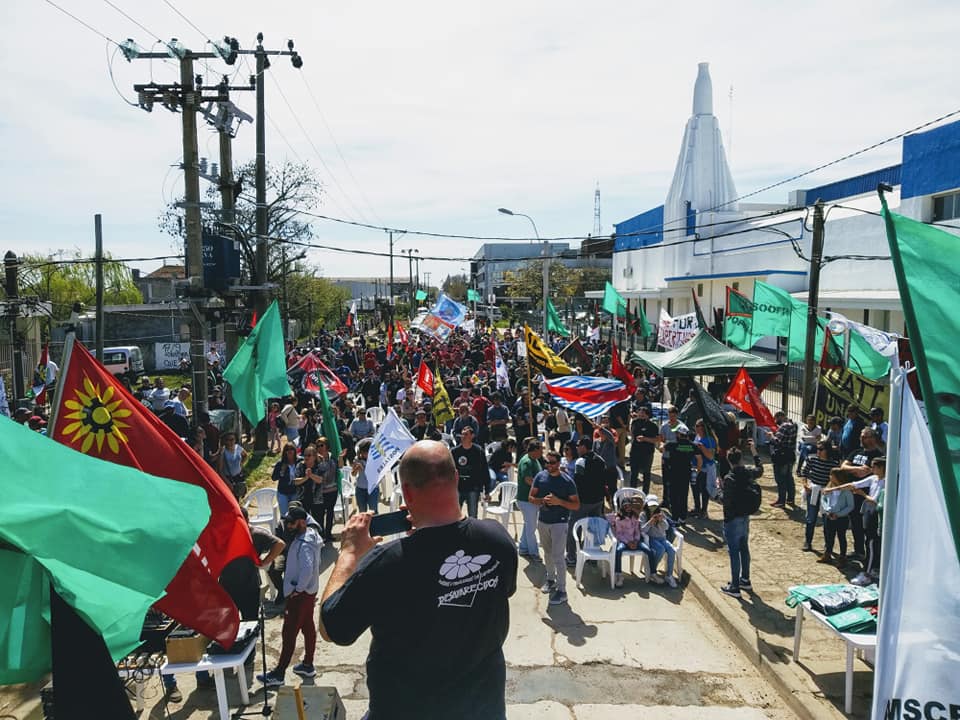RIO DE JANEIRO, BRAZIL – Uruguay experienced this Thursday its second general strike against the government of Luis Lacalle Pou in a “positive” day, according to the trade union central PIT-CNT, with normal activity in a good part of the economic life. The strike was questioned by the ruling party which saw it as only an excuse for the collection of signatures against a law which is intended to be put to a referendum.
This 24-hour general strike which, according to the secretary-general of the PIT-CNT, Marcelo Abdala, was “against hunger and inequality, for work and wages”, was carried out with various activities throughout the country. However, the main event took place in Montevideo with a caravan of cars and the delivery of a letter with demands to the president.

One of the focuses of the day was, in fact, the implementation of several points established throughout the country, which allowed the collection of signatures to continue against 135 articles of the Law of Urgent Consideration (LUC), the star project of the government of Luis Lacalle Pou and approved in July 2020.
This signature collection began months ago, and the objective is to reach the 700,000 necessary before July 9 -when it will be one year since the enactment of the law- for the holding of a popular consultation.
Hundreds of people gathered in front of the Executive Tower in Montevideo to show their demands and leave a letter to Lacalle Pou, delivered by the president of the PIT-CNT, Fernando Pereira, with Abdala.
“We understand that the working population and our people are going through a dramatic situation in the midst of a pandemic, but, in addition, with 100,000 more poor people, with unemployment, with lack of prospects,” commented Abdala.
Although he did not give adhesion figures, the general secretary assured that it was “an enormous general strike” that brought the country to a standstill. However, there was almost normal traffic in the streets, with a normal number of buses and stores open.
Although the strike was called for the whole country, Montevideo was the epicenter of the protest, with a caravan of vehicles that surrounded the Plaza Independencia – where the Executive Tower is located – with horns, shouts, chants, banners, and several demands that included a basic income to reduce mobility, contracting of public works and salary increases.
One of the fears was that the strike would affect the vaccination against Covid-19; however, the Confederation of State Employees’ Organizations (COFE) assured that essential services, such as vaccination, were not affected.
OFFICIAL CRITICISM
The 24-hour strike took place within the framework of the worst moment of the country’s pandemic, which accumulated 348,662 positive cases (30,122 active), 410 people in Intensive Care (ICU), and 5,152 deaths. To all this, it must be added that there are only a few weeks left for the deadline to reach the necessary signatures to go to the referendum.
For this reason, the ruling party accused the PIT-CNT of using the strike and the social crisis as an excuse to have a signature collection day. Specifically, Senator Jorge Gandini stated in declarations to Channel 4 that this strike is “against the LUC” disguised as a strike against the Government.
In the same line, the country’s Minister of Labor and Social Security, Pablo Mieres, pointed out in declarations to Canal 12 that the strike has a “direct relation” with the collection and that “one is not a fool” not to notice the matter.
However, the president of the PIT-CNT affirmed this Wednesday in a conference that to assume that the day was with the sole intention of collecting signatures is “disrespectful” to his intelligence, and that if anyone thought that the union central was not going to fight because it was in a pandemic, “he is very wrong”.

